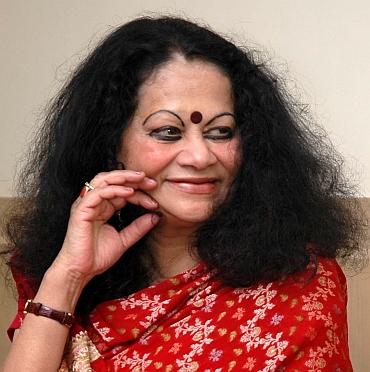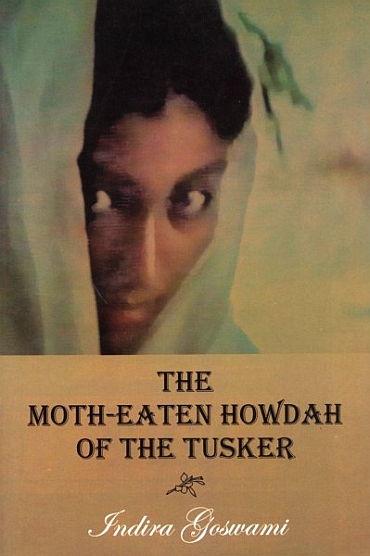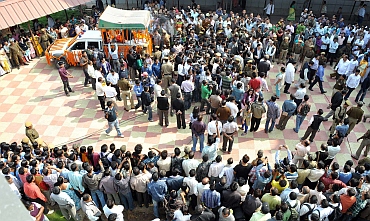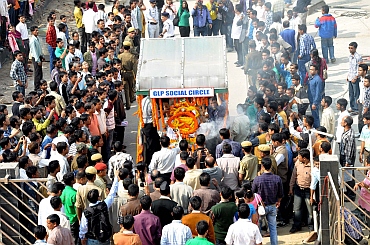 | « Back to article | Print this article |
This Indira fought for dignity of human beings
Writing under the shadow of the three-decade long insurgency in Assam, litterateur Indira Raisom Goswami wielded the pen not only to highlight the issue of violence but also took the initiative of persuading the banned United Liberation Front of Asom to come to the negotiating table.
Preferring to write under the pen name of Mamoni Raisom Goswami, she authored several novels, short stories collection and scholarly treatises reflecting the angst and pain of people from varied backgrounds whose sufferings have deprived them of basic dignity and respect that all deserve.
She took the initiative of persuading the banned ULFA to come forward for dialogue with the outfit even setting up the Peoples' Consultative Group in 2003 and appointing her as an advisor.
Goswami's efforts may not have yielded immediate results but it definitely paved the way for the ongoing talks process between a group of ULFA leaders and the government.
Popularly called 'Mamoni Baideu', Goswami was born on November 14, 1942 in a traditional Vaishnavite family who owned a 'satra' (monastery) at Amranga in South Kamrup.
Click NEXT to read further...
This Indira fought for dignity of human beings
The environs of the satra, both its pristine religious practices along with the prevailing social evils, had a profound influence on the psyche of the young Indira which later found expression in her writings, particularly in her path breaking novel, 'Datal Hatir Une Khowa Howdah' (The Moth Eaten Howdah of a Tusker).
The book, which was later adapted into a national award-winning film 'Adajya', is considered a classic of modern Assamese literature and explores the plight of Assamese Brahmin widows and their exploitation by hypocritical and decadent custodians of power and customs.
Awarded the highest prize for literature in the country -- the Jnanpith in 2000, Goswami was also honoured with the Asom Sahitya Sabha Award and the International Tulsi Award from Florida University for her book Ramayana-Ganga to Brahmaputra.
Goswami had her early education at Pine Mount School in Shillong but was later shifted to the Tarini Charan Girls' High School in Guwahati to enable her to acquire an education in Assamese and acquaint herself more about traditions and culture of the state.
She later studied Assamese at the Cotton College and acquired a postgraduate degree in the same subject from the Gauhati University.
Goswami published her first collection of short stories, 'Chinaki Morom' -- in 1962 while still a student.
Click NEXT to read further...
This Indira fought for dignity of human beings
After completing her education, she met a young engineer, Madhavan Raisom Iyengar, whom she married in 1966 and moved on to Jammu and Kashmir where her husband was posted.
Tragedy struck only after 18 months of marriage when Madhavan was killed in a freak car accident. Suffering from acute depression, she returned to Assam and joined the Goalpara Sainik School as a teacher.
Goswami moved to Vrindavan on the advice of her teacher Upendra Chandra Lekharu who was based there and began research on Ramayani literature. It was in Vrindavan that her social consciousness found expression in her writings and she evolved as an author to reckon with.
Her famed novel 'Neelakantha Braja' was set against the backdrop of Vrindavan and highlights the exploitation of widows while her treatise 'Ramayan from Ganga to Brahmaputra' also had its foundation in Guwahati.
Goswami later joined the Modern Indian Language department of Delhi University and went on to head its Assamese department. To honour her, the University made her the Professor Emeritus in 2009 after her retirement.
Click NEXT to read further...
This Indira fought for dignity of human beings
It was in Delhi that she flourished and earned acclaim as a celebrated writer with several of her stories set against the backdrop of the city.
Goswami's celebrated works include 'Mamore Dhora Tarowal' for which she was awarded the Sahitya Akademi Award in 1982, Ahiron, Chenabor Srot, Dasarathir Khoj, Tej aru Dhulire Dhusarita Prishta and Udaybhanur Charitra Goswami's book 'Chhinnmasatar Manuhto' was against animal sacrifice in the famed Kamakhya Temple, the seat of Shakti worship, which raised the hackles of the temple priests while 'Jatra' is set against the backdrop of insurgency in Assam.
She has several short story and poetry collections to her credit and her autobiography is titled 'Aadha Lekha Dastavej' (An Unfinished Document).
Besides being honoured with the Bharat Nirman Award, Katha National Award for Literature, Iswar Chandra Vidyasagar Gold Plate from Asiatic Society, Principal Prince Klaus Award, she was also awarded D Litt Degree from Rabindra Bharati University, Rajiv Gandhi University and Indira Gandhi National Open University.
Goswami was awarded the Ambassador for Peace from the Inter Religious and International Federation for Peace. She refused the Padma Shri in 2002.
National award winning filmmaker Jahnu Baruah made a film on her life Words from the Mist.



